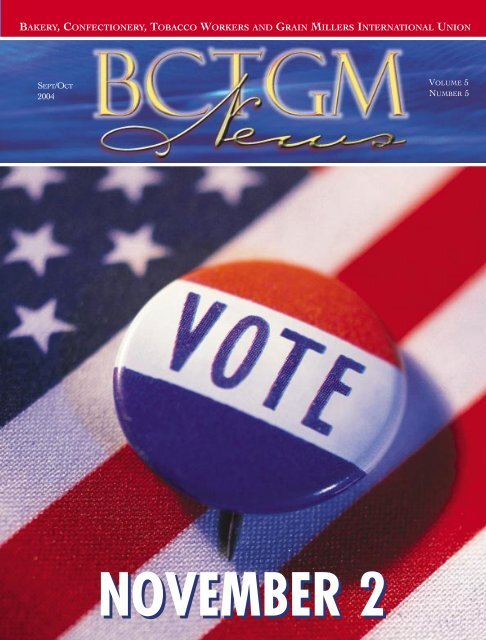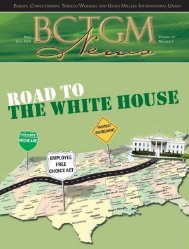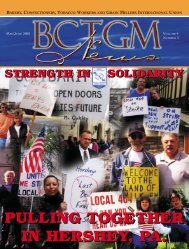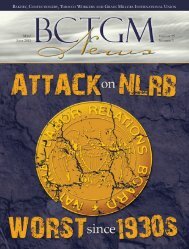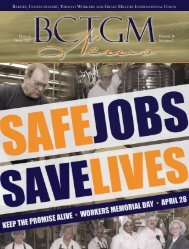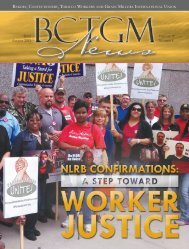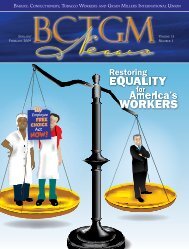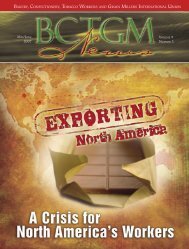to view/print. - Bakery, Confectionery, Tobacco Workers and Grain ...
to view/print. - Bakery, Confectionery, Tobacco Workers and Grain ...
to view/print. - Bakery, Confectionery, Tobacco Workers and Grain ...
You also want an ePaper? Increase the reach of your titles
YUMPU automatically turns print PDFs into web optimized ePapers that Google loves.
BAKERY, CONFECTIONERY, TOBACCO WORKERS AND GRAIN MILLERS INTERNATIONAL UNION<br />
SEPT/OCT<br />
2004<br />
VOLUME 5<br />
NUMBER 5<br />
NOVEMBER 2
the<br />
President’s Message<br />
“The test of our progress is not whether we add more <strong>to</strong> the abundance of those who<br />
have much; it is whether we provide enough for those who have <strong>to</strong>o little.”<br />
Franklin D. Roosevelt, 32nd President of the United States<br />
With these profound words,<br />
Franklin Roosevelt set a st<strong>and</strong>ard<br />
by which Americans are<br />
able <strong>to</strong> judge our society <strong>and</strong> our progress as a nation.<br />
For more than 70 years, through Democratic <strong>and</strong><br />
Republican Administrations, we have made progress.<br />
Unfortunately, the record of the last four years during<br />
the Bush Administration shows the nation failing<br />
the challenge put forth by FDR. Instead of progress,<br />
we are seeing a decline in the st<strong>and</strong>ard of living of the<br />
poor <strong>and</strong> working families.<br />
The most reliable <strong>and</strong> accurate source of information<br />
<strong>to</strong> determine our nation’s condition comes from<br />
the Census Bureau. No doubt statistics are dry, but<br />
they tell an important s<strong>to</strong>ry.<br />
According the Census Bureau, last year the poverty<br />
rate grew by nearly 13 percent, sending millions more<br />
Americans in<strong>to</strong> poverty. Many of these people are<br />
working Americans who have jobs that simply don’t<br />
pay enough. Average household income fell between<br />
2000 <strong>and</strong> 2003 mostly because of job loss or the<br />
replacement of high-wage jobs with lower-wage jobs.<br />
Under President Bush, the nation has experienced<br />
the greatest sustained job loss since Franklin<br />
Roosevelt uttered those words in the depths of the<br />
nation’s greatest economic crisis in its his<strong>to</strong>ry. Since<br />
January of 2001, the economy has lost millions of<br />
jobs, mostly in the well-paid manufacturing sec<strong>to</strong>r.<br />
The jobs statistics may have improved a little over<br />
the past several months, but the reality is that there<br />
are still fewer Americans working <strong>to</strong>day than there<br />
were four years ago. Moreover, many of the new jobs<br />
being created pay workers less than the ones they lost.<br />
<strong>Workers</strong> paychecks are shrinking <strong>and</strong> this is the heart<br />
of the nation’s economic distress.<br />
The nation’s health care crisis compounds this<br />
problem. The share of people with employment-based<br />
health care coverage fell <strong>to</strong> the lowest level in 10<br />
years. Nearly three-quarters of a million more full-time<br />
workers had no health insurance coverage in 2003<br />
than in 2002.<br />
We know that adults <strong>and</strong> children who do not<br />
have health care coverage are not able <strong>to</strong> get the treatment<br />
<strong>and</strong> preventative care that they need <strong>to</strong> stay<br />
healthy. This is why the BCTGM fights so hard in<br />
negotiations <strong>to</strong> maintain our health benefit coverage at<br />
existing levels.<br />
As long as the vast majority of working Americans’<br />
paychecks shrink <strong>and</strong> more <strong>and</strong> more families do not<br />
have access <strong>to</strong> affordable health care, our st<strong>and</strong>ard of<br />
living will continue <strong>to</strong> decline. No amount of happy<br />
talk or 30-second campaign commercials can change<br />
the fundamental truth that American workers are<br />
caught in a race <strong>to</strong> the bot<strong>to</strong>m that is made worse by<br />
the policies of George W. Bush.<br />
President Bush sold the corners<strong>to</strong>nes of his economic<br />
program, trillion-dollar tax cuts for the wealthy<br />
<strong>and</strong> largest corporations <strong>and</strong> multiple free-trade deals,<br />
on the basis that they would create millions of new<br />
jobs <strong>and</strong> increase the st<strong>and</strong>ard of living of American<br />
workers.<br />
The Census Bureau tells us these policies have<br />
failed <strong>and</strong> failed miserably. Not only have these policies<br />
accelerated the loss of good jobs, led <strong>to</strong> declining<br />
wage rates <strong>and</strong> more families without health insurance,<br />
they have also h<strong>and</strong>ed future generations budget<br />
deficits <strong>and</strong> national debt that almost guarantee that<br />
the race <strong>to</strong> the bot<strong>to</strong>m will continue for decades <strong>to</strong><br />
come. Tax cuts for the wealthy <strong>to</strong>day mean tax<br />
increases for working people <strong>to</strong>morrow.<br />
As representatives of working people, labor unions<br />
must always seek <strong>to</strong> improve the lives of their members.<br />
That is our responsibility. And that is the reason<br />
the BCTGM has been tirelessly working <strong>to</strong> change the<br />
political leadership of this country, beginning with the<br />
election of Sena<strong>to</strong>r John Kerry as the next President of<br />
the United States.<br />
On November 2, we will know which direction our<br />
nation will take for the next four years. Moreover, we<br />
will have a better idea as <strong>to</strong> whether or not we will<br />
reverse course <strong>and</strong> begin <strong>to</strong> travel once again along<br />
the path of progress Franklin Roosevelt so clearly<br />
marked.<br />
Frank Hurt<br />
BCTGM International President<br />
Official Publication of the <strong>Bakery</strong>, <strong>Confectionery</strong>, <strong>Tobacco</strong><br />
<strong>Workers</strong> <strong>and</strong> <strong>Grain</strong> Millers International Union<br />
10401 Connecticut Avenue, Kensing<strong>to</strong>n, Maryl<strong>and</strong> 20895-3961<br />
(301) 933-8600<br />
www.bctgm.org<br />
Frank Hurt, Edi<strong>to</strong>r<br />
Corrina A. Christensen, Assistant Edi<strong>to</strong>r<br />
BCTGM GENERAL EXECUTIVE BOARD<br />
President Frank Hurt • Secretary-Treasurer David B. Durkee • Executive Vice Presidents<br />
Joseph Thibodeau • Larry Barber • Vice Presidents Jeanne Graham • Shawn J. Grimm •<br />
Harry A. Guildner • Anthony L. Johnson • Richard Johnson • Sean Kelly •<br />
Michael T. Konesko • Arthur Montminy • Robert Oakley • R<strong>and</strong>y Roark •<br />
Ronald D. Schreiber • T.J. Warren<br />
BCTGM GENERAL EXECUTIVE BOARD MEMBERS<br />
Joyce Als<strong>to</strong>n • Edward Burpo • R<strong>and</strong>y W. Fulk •<br />
Oscar B. Giles • Johnny Jackson • Paul LaBuda •<br />
Richard Lewis • Narcisco Martas • Herbert W. Marx • Danny Murphy •<br />
Donna Scarano • Brad Schmidt • William Spr<strong>and</strong>el • Doyle Townson<br />
BCTGM News (ISSN 1525-4860) is published bi-monthly by the <strong>Bakery</strong>, <strong>Confectionery</strong>, <strong>Tobacco</strong> <strong>Workers</strong> <strong>and</strong> <strong>Grain</strong> Millers<br />
International Union, 10401 Connecticut Avenue, Kensing<strong>to</strong>n, MD 20895-3961. Periodicals postage paid at Kensing<strong>to</strong>n, MD <strong>and</strong> at additional<br />
mailing offices. Subscription <strong>to</strong> new members only. Postmaster: Send address changes <strong>to</strong> BCTGM News, 10401 Connecticut<br />
Avenue, Kensing<strong>to</strong>n, MD 20895-3961.<br />
2<br />
BCTGM News
BCTGM Protests Bush<br />
Overtime Pay Take-Away<br />
BCTGM International President<br />
Frank Hurt, Executive Officers<br />
<strong>and</strong> International staff joined<br />
nearly 1,000 other union<br />
activists outside the U.S.<br />
Department of Labor in<br />
Washing<strong>to</strong>n D.C. on August 23<br />
<strong>to</strong> protest President George W.<br />
Bush’s overtime pay take-away.<br />
Carrying BCTGM signs, “Bush<br />
Thinks <strong>Workers</strong> are Worth Less”<br />
<strong>and</strong> “S<strong>to</strong>p the Bush Pay Grab,”<br />
the union protested the changes<br />
<strong>to</strong> the Fair Labor St<strong>and</strong>ards Act,<br />
the first major attack on the law<br />
since it was enacted in 1938.<br />
“What kind of leader purposely<br />
cuts the paychecks of six<br />
million working Americans at a<br />
time when the economy forces<br />
workers <strong>to</strong> work harder <strong>and</strong><br />
longer <strong>to</strong> make ends meet?,” asks<br />
Hurt. “Bush’s decision <strong>to</strong> gut this<br />
nation’s overtime laws is heartless.<br />
Overtime pay holds many<br />
families above the poverty line<br />
<strong>and</strong> <strong>to</strong> make them work longer<br />
BCTGM Intl. staff <strong>and</strong> family<br />
were among the nearly 1,000<br />
protesters at the rally against<br />
the Bush overtime pay grab.<br />
hours for free is unconscionable,”<br />
Hurt adds.<br />
Under the new rules, most<br />
workers earning<br />
$23,660 a year or<br />
less are guaranteed<br />
time-<strong>and</strong>-a-half pay<br />
for every working<br />
hour over 40 per<br />
week, just as federal<br />
law requires. But<br />
after that, the rules<br />
open a wide range<br />
of methods <strong>to</strong> bosses<br />
who want <strong>to</strong> cut<br />
out workers’ overtime<br />
pay. Up <strong>to</strong> six<br />
million workers will<br />
lose an average of $161 per<br />
week, according <strong>to</strong> the AFL-CIO.<br />
<strong>Workers</strong> covered by a union contract<br />
must bargain <strong>to</strong> retain overtime<br />
pay protections. “And we<br />
know employers will now come<br />
at us hard on our overtime language,”<br />
notes Hurt.<br />
Sena<strong>to</strong>r Tom Harkin (D-Iowa)<br />
spoke at the rally <strong>and</strong> promised<br />
the crowd that Senate Democrats<br />
will continue the fight <strong>to</strong> block<br />
the Bush pay cut. Harkin, who<br />
authored the three measures <strong>to</strong><br />
block the regulations, said, “Time<strong>and</strong>-a-half<br />
pay accounts for 25<br />
percent of the <strong>to</strong>tal income of<br />
those who work overtime. If<br />
employers no longer have <strong>to</strong> pay<br />
time-<strong>and</strong>-a-half for overtime work,<br />
they will have an incentive <strong>to</strong><br />
dem<strong>and</strong> longer hours instead of<br />
creating more jobs, taking money<br />
from the pockets of middle-class<br />
working families. Protecting workers’<br />
overtime is essential <strong>to</strong> job<br />
creation.”<br />
Overtime rallies like the one<br />
BCTGM Intl. President Frank<br />
Hurt (left) explains the effects<br />
of the overtime pay take-away<br />
<strong>to</strong> an NBC reporter as Intl.<br />
Exec. Vice President Joe<br />
Thibodeau (center) <strong>and</strong> Intl.<br />
staff person Matthew Clark<br />
(right) listen outside the Dept.<br />
of Labor on Aug. 23.<br />
at the Department of Labor <strong>to</strong>ok<br />
place throughout the country on<br />
August 23. Since Bush<br />
announced the overtime pay<br />
take-away in March 2003, workers<br />
have sent more than 1.6 million<br />
email, mail <strong>and</strong> fax messages<br />
<strong>to</strong> the White House,<br />
Congress <strong>and</strong> the Department of<br />
Labor protesting the assault on<br />
the nation’s wage <strong>and</strong> hour laws.<br />
AFL-CIO President John<br />
Sweeney, who also spoke at the<br />
rally, reminded the crowd that<br />
the fight <strong>to</strong> save overtime pay is<br />
far from over <strong>and</strong> another<br />
recourse is the November presidential<br />
election. “If Bush will not<br />
st<strong>and</strong> on the side of working people,<br />
then we will use our democratic<br />
process <strong>to</strong> elect a president<br />
who will,” he declared.<br />
To sign the BCTGM’s<br />
new petition <strong>to</strong> save overtime<br />
pay, visit the BCTGM E-<br />
Activist Network www.unionvoice.org/campaign/Otpetition.<br />
September/Oc<strong>to</strong>ber 2004<br />
www.bctgm.org<br />
3
OVERTIME<br />
UNDER<br />
ATTACK<br />
By Sen. Tom Harkin (D-Iowa)<br />
In April, the Bush<br />
Administration issued final<br />
rules governing eligibility for<br />
overtime. Make no mistake, this<br />
radical rewrite of the rules is<br />
designed <strong>to</strong> strip millions of<br />
workers of their right <strong>to</strong><br />
fair compensation. It is a<br />
frontal attack on the 40-<br />
hour workweek, pushed<br />
aggressively by the<br />
Administration without a<br />
single public hearing.<br />
Since passage of the<br />
Fair Labor St<strong>and</strong>ards Act<br />
in 1938, overtime rights<br />
<strong>and</strong> the 40-hour workweek<br />
have been sacrosanct—respected<br />
by presidents<br />
of both parties.<br />
But nothing is sacred <strong>to</strong><br />
the Bush Administration. Nor<br />
does the Administration seem <strong>to</strong><br />
care that these new rules will<br />
hurt job creation.<br />
If employers can more easily<br />
deny overtime pay, they will simply<br />
push their current employees<br />
<strong>to</strong> work longer hours without<br />
compensation. With millions<br />
Americans out of work, why give<br />
employers a major new disincentive<br />
<strong>to</strong> hire new workers?<br />
Indeed, when the first overtime<br />
statutes were written in<br />
1938, during the Great<br />
Depression, a major aim was <strong>to</strong><br />
encourage the creation of new<br />
jobs. But there is a more<br />
poignant argument for overtime.<br />
As one single mother <strong>to</strong>ld me,<br />
when she leaves work after a difficult<br />
8-hour shift, her “second<br />
shift”—cooking <strong>and</strong> caring for<br />
her family—begins. She <strong>to</strong>ld me<br />
that her time at home is truly her<br />
“premium time,” the most valuable<br />
time of her day. And if she<br />
is going <strong>to</strong> be required <strong>to</strong> sacrifice<br />
that premium time, then she<br />
ought <strong>to</strong> receive premium pay.<br />
The Bush Administration disagrees.<br />
The final rule was issued<br />
in the spring <strong>and</strong> <strong>to</strong>ok effect<br />
August 23, just before Labor Day.<br />
It will deny time-<strong>and</strong>-a-half<br />
overtime pay <strong>to</strong> many workers<br />
earning as little as $23,660.<br />
Nonetheless, the Administration’s<br />
public posture is all smiles <strong>and</strong><br />
happy talk, including the audacious<br />
claim that no workers earning<br />
less than $100,000 a year will<br />
lose their right <strong>to</strong> overtime.<br />
This claim is demonstrably<br />
false. In July, a study by the<br />
Economic Policy Institute (EPI)<br />
concluded that at least six million<br />
U.S. workers will lose their right<br />
<strong>to</strong> overtime under the final rule.<br />
Under the old rule, employees<br />
were required <strong>to</strong> spend the<br />
majority of their time—50 percent<br />
or more—doing administrative,<br />
management or professional<br />
work in order <strong>to</strong> lose their right<br />
<strong>to</strong> overtime. But under the new<br />
rule, employees who do even a<br />
small amount of administrative,<br />
management or professional<br />
work during the day can lose<br />
their overtime rights.<br />
An independent re<strong>view</strong> of the<br />
new rule by former Department<br />
of Labor (DOL) officials concluded<br />
that in every instance where<br />
DOL made some sort of change<br />
<strong>to</strong> the existing rule, it chose <strong>to</strong><br />
weaken the criteria for overtime<br />
exemptions, thereby making<br />
workers vulnerable <strong>to</strong> the loss of<br />
overtime eligibility.<br />
Ironically, the Administration<br />
originally argued its<br />
new overtime plan<br />
was needed <strong>to</strong> clarify<br />
the rules <strong>and</strong> reduce<br />
litigation. But the final<br />
rule is shot through<br />
with calculated ambiguity<br />
that clearly<br />
favors employers. This<br />
will lead <strong>to</strong> scores of<br />
lawsuits <strong>and</strong> years of<br />
litigation as workers<br />
fight <strong>to</strong> retain their<br />
overtime rights. If<br />
increasingly conservative<br />
courts rule in favor of<br />
employers, countless additional<br />
workers will lose their right <strong>to</strong><br />
overtime.<br />
American workers are fed up<br />
with the Administration’s<br />
schemes <strong>and</strong> spin. They deserve<br />
an iron-clad guarantee that their<br />
overtime rights are safe. If Mr.<br />
Bush <strong>and</strong> DOL are sincere in<br />
their stated desire <strong>to</strong> preserve<br />
overtime, they can prove it by<br />
supporting my legislation <strong>to</strong><br />
guarantee that workers who are<br />
entitled <strong>to</strong> overtime pay as a<br />
result of their job duties under<br />
the old rules will not lose that<br />
right under the new rules.<br />
4<br />
BCTGM News
100 Years Young: Local 114<br />
Celebrates a His<strong>to</strong>ry of Activism<br />
AAfter 100 years of defending the<br />
rights of bakery workers in the<br />
Pacific Northwest, BCTGM Local<br />
114 (Portl<strong>and</strong>, Ore.) shows no<br />
signs of slowing down. On<br />
August 27, the local celebrated<br />
its 100th anniversary with the<br />
same energy <strong>and</strong> devotion that<br />
the founding members of the<br />
union displayed, according <strong>to</strong><br />
Local 114 Financial Secretary-<br />
Treasurer Laurel Koch.<br />
“It’s amazing how a lot of the<br />
issues that this union fought for<br />
100 years ago—better<br />
wages, hours <strong>and</strong> working<br />
conditions—are the<br />
same issues we fight for<br />
<strong>to</strong>day. On that level, not<br />
much has changed,”<br />
said Koch.<br />
Koch <strong>and</strong> a team of<br />
volunteers spent months<br />
researching the his<strong>to</strong>ry<br />
of the union for a booklet<br />
that was given <strong>to</strong><br />
Local 114 members in<br />
honor of the local’s 100-<br />
year anniversary. The<br />
research team consisted<br />
of Koch, members<br />
Nancy Milner, Sharon<br />
Graham, Georgene<br />
Barragan, <strong>and</strong> her<br />
daughter, Erin.<br />
The local began with members<br />
at just 15 retail shops.<br />
Today, Local 114 represents more<br />
than 1,140 workers at some 160<br />
retail <strong>and</strong> wholesale bakeries—<br />
most of the wholesale bakeries in<br />
the Portl<strong>and</strong> metropolitan area<br />
under union contract.<br />
“In March of 1904, union<br />
label bread was seen for the first<br />
time. A committee had been<br />
appointed <strong>to</strong> visit various retail<br />
s<strong>to</strong>res <strong>and</strong> request the managers<br />
<strong>to</strong> buy no bread unless it has the<br />
seal of organized labor stamped<br />
upon its side,” writes the<br />
research team in the Bakers<br />
Union Local 114 His<strong>to</strong>ry.<br />
The fight of the Bakers Union<br />
in 1904 was borne directly upon<br />
the health <strong>and</strong> welfare of the<br />
home. The bakers fight was <strong>to</strong><br />
give families bread, cake <strong>and</strong><br />
pies prepared under sanitary<br />
conditions. “The Union Label<br />
Local 114 Bus. Agt. Gene Beaudoin (left) Fin.<br />
Secy. Laurel Koch (center) <strong>and</strong> member<br />
Georgene Barragan display a pho<strong>to</strong> of the Local<br />
114 “Knights of Peel” in the 1919 Labor Day<br />
parade in Portl<strong>and</strong>.<br />
was a guarantee that your bakery<br />
products were prepared in<br />
wholesome, clean, well-ventilated<br />
shops from materials that<br />
were free from poisons <strong>and</strong> adulterants,”<br />
notes Koch.<br />
“Local 114 even required a<br />
medical exam for members <strong>to</strong><br />
make sure they were free of<br />
tuberculosis or other contagious<br />
diseases. The Union Label s<strong>to</strong>od<br />
not only for quality but also<br />
cleanliness,” Koch recalls.<br />
By 1912, Local 114 had been<br />
so adamant about the sanitary<br />
conditions of its shops, Portl<strong>and</strong><br />
could now boast of having the<br />
most sanitary union bakeries in<br />
the United States. Local 114<br />
helped bakers win a 35-hour<br />
workweek. At the time, bakers<br />
worked for 16 hours a day, six<br />
days a week. Later, in the mid-<br />
1950s, the local was able <strong>to</strong><br />
secure employer-paid pensions<br />
<strong>and</strong> language protecting<br />
members from the effects<br />
of mechanization. Koch<br />
also discovered language<br />
in an early contract that<br />
called on employers “<strong>to</strong><br />
pay girls the same wage as<br />
the men they replaced.”<br />
“Local 114 s<strong>to</strong>od strong<br />
<strong>and</strong> survived, several<br />
times coming very close <strong>to</strong><br />
being put out of business<br />
by anti-union forces,”<br />
Koch recalls. “It is simply<br />
amazing that we continue<br />
<strong>to</strong> fight for the same things<br />
<strong>to</strong>day that we’ve fought<br />
hard <strong>and</strong> won in the past.<br />
His<strong>to</strong>ry is a revolving<br />
door—a different angle but<br />
the same issues.<br />
“Throughout our his<strong>to</strong>ry, we<br />
have grown in strength <strong>and</strong> in<br />
numbers. There is no doubt that<br />
this local union will continue <strong>to</strong><br />
add a wealth of his<strong>to</strong>ry <strong>and</strong> color<br />
<strong>to</strong> the books of the BCTGM for<br />
many years <strong>to</strong> come,” concludes<br />
Koch, who retirees later this year<br />
after more than 22 years as a<br />
Local 114 officer <strong>and</strong> 36 years in<br />
the baking industry.<br />
September/Oc<strong>to</strong>ber 2004 www.bctgm.org 5
Local 369G Lockout Ends in Minnesota<br />
RRenville, Minn.—Solidarity <strong>and</strong><br />
resolve led <strong>to</strong> vic<strong>to</strong>ry for members<br />
of BCTGM Local 369G—who<br />
were locked out by Southern<br />
Minnesota Beet Sugar Cooperative<br />
for four weeks—as they<br />
returned <strong>to</strong> work on August 25<br />
after approving a new contract.<br />
The 220 BCTGM members<br />
were locked out of the plant on<br />
July 29 after they rejected the<br />
company’s contract offer that<br />
incorporated substantial changes<br />
in their health care plan, including<br />
increased deductibles <strong>and</strong><br />
employee premium payments.<br />
Under the new three-year<br />
agreement, workers will not pay<br />
health insurance premiums <strong>and</strong><br />
will pay only small increases in<br />
medical deductibles, prescription<br />
co-pays <strong>and</strong> out-of-pocket maximums.<br />
The contract also includes<br />
annual pay increases of two percent<br />
<strong>and</strong> annual pension increases<br />
of $1 per month of service.<br />
The first lockout ever at the<br />
nearly 30-year old plant came as<br />
a shock <strong>to</strong> many. Union members<br />
maintained 24-hour informational<br />
pickets outside the<br />
plant during the lockout <strong>to</strong> educate<br />
the community.<br />
According <strong>to</strong> Local 369G<br />
President R<strong>and</strong>y Billmeier, during<br />
the lockout worker morale<br />
was high thanks <strong>to</strong> the community<br />
support they received.<br />
Bottled water, soda <strong>and</strong> snacks<br />
were delivered regularly with<br />
words of encouragement <strong>to</strong> workers<br />
outside the plant. “The workers<br />
really enjoyed the support.<br />
We had a lot of folks on our<br />
side,” recalls Billmeier.<br />
In a larger community, a lockout<br />
of 220 workers might be<br />
invisible, but not in a <strong>to</strong>wn like<br />
Renville, population 1,323. “The<br />
lockout affected everyone in the<br />
community,” said Local 369G<br />
member Craig Gednalske.<br />
The Southern Minnesota Beet<br />
Sugar Cooperative is a huge<br />
complex on a road at the edge of<br />
Renville, located about 100 miles<br />
west of the Twin Cities. Along the<br />
backside of the plant are large<br />
lots where beets are piled high<br />
after harvest. During the fall <strong>and</strong><br />
winter, pipes run through the<br />
piles, carrying coolant <strong>to</strong> keep<br />
the mounds frozen <strong>and</strong> allowing<br />
the processing of the beets <strong>to</strong><br />
take place over several months.<br />
The cooperative refines beets<br />
in<strong>to</strong> sugar, lives<strong>to</strong>ck feed <strong>and</strong><br />
other products.<br />
Farmers act as shareholders<br />
for the acres of beets planted in<br />
14 counties across southwestern<br />
Minnesota. They bring their crop<br />
<strong>to</strong> the plant, where union members<br />
turn the beets in<strong>to</strong> sugar for<br />
c<strong>and</strong>y companies <strong>and</strong> other business.<br />
August is usually a critical<br />
time at the cooperative, as workers<br />
get the plant ready for harvest,<br />
which generally begins in<br />
September. All the staff <strong>and</strong><br />
equipment must be ready <strong>to</strong><br />
unload hundreds of truckloads of<br />
beets, slice <strong>and</strong> process them<br />
<strong>and</strong> bag <strong>and</strong> ship out millions of<br />
pounds of products.<br />
“There is a lot of work <strong>to</strong> be<br />
done,” said Marie Revier, a 15-<br />
year employee. Echoing Revier is<br />
Gerald Reinke, who has been with<br />
the company since its beginning.<br />
“We basically make this place go,”<br />
Reinke said. “We’re the ones who<br />
get down in all the dirt <strong>and</strong> cold.”<br />
Edi<strong>to</strong>rs Note: The pho<strong>to</strong>s<br />
<strong>and</strong> background material used<br />
with this article were provided<br />
by Workday Minnesota,<br />
www.workdayminnesota.org<br />
Local 369G maintained 24-<br />
hour informational pickets<br />
outside the main gate <strong>to</strong><br />
the Southern Minnesota<br />
Beet Sugar Coop. throughout<br />
the lockout.<br />
6<br />
BCTGM News
BCTGM Negotiates Nabisco Pattern<br />
BBCTGM negotia<strong>to</strong>rs reached a<br />
nationwide three-<strong>and</strong>-a-half year<br />
agreement with Kraft Foods North<br />
America in mid-September for the<br />
nine former Nabisco facilities.<br />
This was the second negotiated<br />
national agreement between the<br />
BCTGM <strong>and</strong> Kraft Foods since<br />
Kraft acquired Nabisco in 2001.<br />
The agreement, which runs<br />
through February 2008, was led by<br />
International Vice President Bob<br />
Oakley with the assistance of<br />
International Representative James<br />
Condran. Representatives from<br />
Local 26 (Denver), Local 42<br />
(Atlanta), Local 83 (Buena Park,<br />
Calif.), Local 300 (Chicago), Local<br />
358 (Richmond, Va.), Local 364<br />
(Portl<strong>and</strong>, Ore.), Local 492<br />
(Philadelphia), Local 719 (Fair<br />
Lawn, N.J.), <strong>and</strong> Local 802<br />
(Buffalo, N.Y.) made up the negotiating<br />
committee.<br />
According <strong>to</strong> Oakley, the negotiating<br />
committee had a clear<br />
underst<strong>and</strong>ing of what the members<br />
expectations were <strong>and</strong> the<br />
direction they wanted the negotia<strong>to</strong>rs<br />
<strong>to</strong> go in. “Our members <strong>to</strong>ld<br />
us quite clearly they wanted us <strong>to</strong><br />
do everything we could <strong>to</strong> protect<br />
their health benefits, increase<br />
their pensions <strong>and</strong> gain healthy<br />
wage increases,” said Oakley.<br />
“We set our sights on delivering a<br />
Pictured here are representatives<br />
from nine BCTGM local unions that<br />
made up the negotiating committee.<br />
BCTGM Intl. Vice Pres. <strong>and</strong> lead negotia<strong>to</strong>r Bob Oakley (right) <strong>and</strong><br />
Intl. Rep. Jim Condran (left) re<strong>view</strong> the final three-year national<br />
agreement between the BCTGM <strong>and</strong> Kraft Foods.<br />
fine contract tailored <strong>to</strong> their<br />
m<strong>and</strong>ate,” he said.<br />
Highlighting the negotiations<br />
was the maintenance of all<br />
health benefits, levels <strong>and</strong> costs<br />
for the life of the contract.<br />
BCTGM International President<br />
Frank Hurt congratulated the<br />
union negotia<strong>to</strong>rs for a job well<br />
done. “At a time when most<br />
companies are shifting the health<br />
insurance burden on<strong>to</strong> employees,<br />
our union is doing everything<br />
we can <strong>to</strong> protect our members<br />
benefits,” commends Hurt.<br />
In addition, the new agreement<br />
secures healthy pension<br />
increases for retirees. By the end<br />
of the contract, the company’s<br />
contribution rate will be<br />
increased <strong>to</strong> $1,600.00. In addition,<br />
beginning September 1,<br />
2004, the company will provide<br />
P-Plan 26 at a $15,600.00<br />
level. According <strong>to</strong> Hurt, securing<br />
a members well-being after retirement<br />
is always a priority. “Our<br />
dedicated members put in a<br />
tremendous amount of effort <strong>to</strong><br />
make this a successful company,”<br />
said Hurt. “This contract rewards<br />
them for years of hard work.”<br />
The contract also provides for<br />
significant wage increases, new<br />
contract language for pay for<br />
military leave, <strong>and</strong> changes <strong>to</strong><br />
the attendance bonus. Local 42<br />
Business Agent <strong>and</strong> member of<br />
the negotiating committee,<br />
Johnny Jackson said his members<br />
were very happy about the<br />
new agreement. “We received<br />
tremendous support from our<br />
membership going in<strong>to</strong> negotiations.<br />
We came away from the<br />
table with a contract we were<br />
proud <strong>to</strong> present back <strong>to</strong> them,”<br />
concludes Jackson.<br />
September/Oc<strong>to</strong>ber 2004 www.bctgm.org 7
WHO’S ON OUR SIDE: WHAT’S ATSTAKE NOVEMBER 2<br />
John Kerry<br />
Good Jobs<br />
Plans <strong>to</strong> create 10 million new jobs in his first<br />
four years as president. His energy policy alone will<br />
create some 500,000 good jobs. (Associated Press,<br />
3/25/04)<br />
Supports workers’ right <strong>to</strong> overtime pay protection<br />
<strong>and</strong> co-sponsored legislation <strong>to</strong> s<strong>to</strong>p Bush administration<br />
<strong>to</strong> take overtime pay from millions of U.S.<br />
workers. (AFL-CIO questionnaire, 2003; S. Amdt.<br />
1580, 2003)<br />
Will reform the federal unemployment insurance<br />
program <strong>to</strong> cover more workers <strong>and</strong> provide sufficient benefits <strong>and</strong> job training.<br />
(www.johnkerry.com)<br />
Exporting America<br />
Will fight <strong>to</strong> keep good jobs in America. He will s<strong>to</strong>p tax breaks <strong>to</strong> companies that<br />
send U.S. jobs overseas <strong>and</strong> create tax incentives <strong>to</strong> keep good U.S. jobs at home.<br />
Will ensure companies that move offshore do not receive government contracts.<br />
(www.johnkerry.com)<br />
Trade & Manufacturing<br />
Proposes a new manufacturing job credit for manufacturing firms <strong>to</strong> stay <strong>and</strong><br />
exp<strong>and</strong> in the United States. (www.johnkerry.com)<br />
Acknowledges the problems of the North American Free Trade Agreement<br />
(NAFTA) <strong>and</strong> vows <strong>to</strong> fix “every single unfairness” including strong worker protections<br />
in all new trade agreements. (H.R. 3450, 11/20/93; The New York Times,<br />
2/17/04; Kerry speech at Alliance for Economic Justice event, 2/17/04;<br />
www.johnkerry.com)<br />
Retirement Security<br />
Supports protecting the retirement pensions of America’s workers by strengthening<br />
<strong>and</strong> enforcing rules <strong>to</strong> guard pension funds from raids by unscrupulous employers<br />
<strong>and</strong> creating new protections for pension funds invested in the mutual fund<br />
market. (www.johnkerry.com; The Union Leader, 1/7/04)<br />
Supports strengthening Social Security <strong>and</strong> opposes any privatization plan <strong>to</strong><br />
h<strong>and</strong> over Social Security funds <strong>to</strong> Wall Street firms. (Des Moines Register, 8/14/03)<br />
Safety <strong>and</strong> Health<br />
Voted <strong>to</strong> preserve the nation’s first workplace repetitive motion injury st<strong>and</strong>ard<br />
that could have protected workers from 8 million repetitive stress injuries a year.<br />
(S. J. Res. 6, R.C. 15, 3/6/01)<br />
Supports a more effective Occupational Safety <strong>and</strong> Health Administration<br />
(OSHA) <strong>and</strong> more safety training. (www.johnkerry.com/issues/workers)<br />
America Is Losing<br />
Good Jobs<br />
Jobs in growing industries pay<br />
25 percent less, on average,<br />
than jobs in shrinking industries.<br />
Average Annual Wages, March 2001-March 2003<br />
Difference: 25%<br />
$45,356<br />
Shrinking<br />
industries<br />
Source: Economic Policy Institute, analysis of Bureau of Labor Statistics data.<br />
America is Losing<br />
Health Care Coverage<br />
Jobs in growing industries are less likely <strong>to</strong><br />
provide health coverage than jobs in<br />
shrinking industries.<br />
Percentage of <strong>Workers</strong> with Employer-Provided<br />
Health Coverage, March 2001-March 2004<br />
67.9%<br />
Shrinking<br />
industries<br />
$33,941<br />
Growing<br />
industries<br />
54.8%<br />
Growing<br />
industries<br />
Source: Jeff Chapman <strong>and</strong> Elise Gould, “Jobs shift away from<br />
industries that provide health insurance <strong>to</strong> their workers.”<br />
Economic Policy Institute, 5/12/04. Available at<br />
www.epinet.org/content.cfm/webfeatures_snapshots_05122004.<br />
Good Jobs<br />
President Bush’s economic policies <strong>and</strong> tax cuts for the rich cost the<br />
nation 1.8 million private-sec<strong>to</strong>r jobs <strong>and</strong> 2.7 million manufacturing jobs,<br />
from January 2001 <strong>to</strong> June 2004. Bush is on track <strong>to</strong> be the first president<br />
since Herbert Hoover in the Great Depression <strong>to</strong> end his term with fewer<br />
jobs than when he started. Nearly two-thirds of the jobs created between<br />
August 2003 <strong>and</strong> May 2004, when the economy finally began adding some<br />
jobs, were in low- <strong>and</strong> medium-wage industries. (Bureau of Labor Statistics;<br />
Economy.com, July 2004)<br />
The Bush Administration developed <strong>and</strong> issued new rules that could cost<br />
some 6 million workers their right <strong>to</strong> overtime pay. (Federal Register, vol. 68,<br />
no. 61, 3/31/03; www.epinet.org)<br />
Wants <strong>to</strong> cut funds for dislocated workers <strong>and</strong> job training—his fiscal year 2005 budget for job training<br />
<strong>and</strong> employment programs is $1 billion less than 2001 levels, despite the loss of 1.8 million jobs since 2001.<br />
(Bush Administration fiscal year 2005 budget; Bureau of Labor Statistics)<br />
Exporting America<br />
Supports giving $60 billion in tax breaks <strong>to</strong> companies that lay off workers <strong>and</strong> move overseas. Since<br />
taking office, each of Bush’s federal budget proposals included tax breaks for companies that export jobs<br />
overseas. (H.R. 2896, 2004; The Washing<strong>to</strong>n Post, 10/23/03; Bush fiscal years 2002-2005 budget proposals)<br />
Says exporting jobs is good for America. According <strong>to</strong> The Economic Report of the President, 2004,<br />
“When a good or service is produced more cheaply abroad, it makes more sense <strong>to</strong> import it than <strong>to</strong><br />
provide it domestically.” (Economic Report of the President, 2004)<br />
Trade & Manufacturing<br />
Wants <strong>to</strong> exp<strong>and</strong> NAFTA <strong>to</strong> 34 new countries in Central <strong>and</strong> South America <strong>and</strong> sought authority <strong>to</strong><br />
negotiate new trade agreements without enforceable workers’ rights <strong>and</strong> environmental protections, saying<br />
“legitimate environmental <strong>and</strong> labor concerns” should not “undermine the capacity of the president” <strong>to</strong><br />
make trade agreements. (The Washing<strong>to</strong>n Post, 6/21/01)<br />
Retirement Security<br />
Seeks repeal of current protections for workers’ retirement security <strong>and</strong> would allow mutual funds <strong>and</strong><br />
other investment managers <strong>to</strong> give workers investment advice on their 401(k) accounts even though such<br />
advice could represent a conflict of interest (H.R. 2269, 6/21/01)<br />
Plans <strong>to</strong> privatize Social Security, making workers’ retirement security subject <strong>to</strong> the whims of Wall<br />
Street while costing the Social Security system between $2.2 trillion <strong>and</strong> $3.1 trillion. (Reducing Benefits <strong>and</strong><br />
Subsidizing Individual Accounts: An Analysis of the Plans Proposed by the President’s Commission <strong>to</strong><br />
Strengthen Social Security, Center on Budget <strong>and</strong> Policy Priorities <strong>and</strong> The Century Foundation, June 2002)<br />
Safety <strong>and</strong> Health<br />
George W. Bush<br />
Repealed the nation’s first repetitive motion injury rule that was 10 years in the making. (www.cnn.com,<br />
3/20/01)<br />
Cut funding for worker safety programs for 2005 by $7.1 million—65 percent. (Bush Administration’s<br />
fiscal year 2005 budget proposal)<br />
8<br />
BCTGM News<br />
September/Oc<strong>to</strong>ber 2004 www.bctgm.org 9
The S<strong>to</strong>ry of San Francisco Sourdough Bread<br />
“Lac<strong>to</strong>bacillus Sanfrancisco” may<br />
not sound like a precious commodity, but it’s<br />
the secret ingredient first discovered in San<br />
Francisco in 1849 that makes the city’s sourdough<br />
bread world-famous.<br />
Using bread “starters”—an ancient method<br />
of making bread with a fermented mixture of<br />
flour, water, <strong>and</strong> yeast—was common practice<br />
in the 19th century. Miners purchased such<br />
starters in San Francisco <strong>and</strong> carried them on<br />
their treasure-seeking journeys <strong>to</strong> the Sierra<br />
foothills, where they baked loaves with a<br />
unique, sour tang found nowhere else in the<br />
world. Their sourdough bread was so much a<br />
part of the culture that seasoned prospec<strong>to</strong>rs<br />
came <strong>to</strong> be known as “sourdoughs”—having<br />
long fermented in the mines.<br />
A group of wild microorganisms, which<br />
thrive only in the Bay Area’s unique climate,<br />
work <strong>to</strong>gether in a feat of culinary science <strong>to</strong><br />
produce the unparalleled bread. While most<br />
breads are leavened using a single genetic<br />
strain of commercial yeast, sourdough relies<br />
on these wild microorganisms for leavening as<br />
well as flavor. Using a bowl of flour <strong>and</strong> water<br />
as bait, the baker makes a starter by capturing<br />
yeasts <strong>and</strong> bacteria (including lac<strong>to</strong>bacillus<br />
sanfrancisco) from the air, the mixing bowl<br />
itself, even the baker’s h<strong>and</strong>s.<br />
Feeding on the flour, these microorganisms<br />
begin <strong>to</strong> multiply. The yeasts give off<br />
carbon dioxide, which makes the dough rise,<br />
while the bacteria produce lactic acid <strong>and</strong><br />
acetic acid (vinegar), which contribute the<br />
sour flavor. Once the dough is made, a bit of<br />
it is folded back in<strong>to</strong> the unused portion of<br />
the starter, providing sustenance for the<br />
ever-growing microrganisms, which is henceforth<br />
known as “the mother loaf.” Fed a regular<br />
diet of flour <strong>and</strong> water, this mother<br />
strain continues <strong>to</strong> multiply, creating new<br />
“babies” every day, producing descendents<br />
indefinitely. In fact, BCTGM Local 24 members<br />
at the Parisian <strong>Bakery</strong> in San Francisco<br />
still use the same “mother” strain that was<br />
created more than 120 years ago.<br />
While sourdough breads have been made<br />
throughout the world, San Francisco’s sourdough<br />
is widely regarded as the best in the<br />
world. Today, Local 24 members continue<br />
the his<strong>to</strong>ric formula at the San Francisco<br />
French Bread Company, producing the<br />
world-famous breads under the Parisian,<br />
Toscana <strong>and</strong> Colombo names.<br />
Pictured on these pages are Local 24<br />
members at the Parisian plant in San<br />
Francisco who remain dedicated <strong>to</strong> art of<br />
baking San Francisco’s best-loved breads.<br />
10<br />
BCTGM News<br />
September/Oc<strong>to</strong>ber 2004 www.bctgm.org 11
Local 464 Receives<br />
Outst<strong>and</strong>ing Donor Award<br />
Hershey, Pa.—Since 1985, Local 464 Hershey workers have<br />
helped save the lives of more than 34,000 members of their<br />
community, thanks <strong>to</strong> blood donations that <strong>to</strong>taled 11,471 pints.<br />
In recognition of the union members’ dedication <strong>to</strong> helping<br />
their community, the local was presented with the “Outst<strong>and</strong>ing<br />
Donor Group Award” at the Central Pennsylvania Blood Bank<br />
Appreciation Dinner. According <strong>to</strong> Local 464 Blood Bank<br />
Chairperson S<strong>and</strong>ra Lameraux, the local union conducts three<br />
blood drives annually at the Hershey Chocolate plants. In the<br />
last eight years alone, Local 464 members have donated 3,522<br />
pints of blood during blood drives.<br />
Pictured here is (left <strong>to</strong> right) Central<br />
Pennsylvania Blood Bank Vice<br />
President of Community Relations<br />
Claire Hall, Lamereaux <strong>and</strong> Local 464<br />
Blood Bank Co-Chair Barbara Gossard.<br />
2005 BCTGM<br />
INTERNATIONAL<br />
SCHOLARSHIP<br />
PROGRAM<br />
The BCTGM International Scholarship<br />
Program will award ten $1,000 one-time<br />
scholarship awards in 2005. One of the<br />
scholarships is reserved for a Canadian <strong>and</strong><br />
up <strong>to</strong> three of the ten is designated for active<br />
members of the BCTGM. The deadline for<br />
applications in January 31, 2005.<br />
To learn more about this special BCTGM<br />
membership feature, you will find the official<br />
rules <strong>and</strong> regulations for the 2005<br />
BCTGM International Scholarship Program<br />
<strong>and</strong> the application (both in French <strong>and</strong><br />
English) posted on the union’s website,<br />
www.bctgm.org.<br />
Weak Economy<br />
Prevents B&C<br />
Retiree Bonus<br />
The <strong>Bakery</strong> <strong>and</strong> <strong>Confectionery</strong> Union <strong>and</strong><br />
Industry International Pension Plan will not<br />
be able <strong>to</strong> provide a bonus for its pensioners<br />
this year. The Fund’s actuaries have notified<br />
the trustees that due <strong>to</strong> the continued<br />
weak economy <strong>and</strong> recent federal legislation<br />
increasing funding requirements for<br />
pension plans such as the B&C Fund it<br />
would be impossible <strong>to</strong> provide a bonus in<br />
2004.<br />
Fund Chairman <strong>and</strong> BCTGM International<br />
President Hurt explains, “I am extremely<br />
disappointed <strong>to</strong> have <strong>to</strong> announce <strong>to</strong> our<br />
retirees that they will not be getting a<br />
bonus again this year. In <strong>view</strong> of the fact<br />
that our retirees are paying more every day<br />
for the necessities of life, including health<br />
care coverage, it is particularly distressing<br />
<strong>to</strong> know that we can’t help these good<br />
people by giving them a bonus <strong>to</strong> defer<br />
some of these costs. Hopefully, the economy<br />
will improve enough <strong>and</strong> the Fund’s<br />
earnings will be sufficient <strong>to</strong> allow bonuses<br />
in the future.”<br />
12<br />
BCTGM News
BCTGM Canada Meets in Calgary<br />
Over a four-day period in<br />
mid-August, delegates <strong>to</strong><br />
the Western Canada<br />
Council met in Calgary, Alberta.<br />
Attending the meeting were representatives<br />
from Locals 252<br />
(Calgary), 468 (Vancouver, B.C.),<br />
<strong>and</strong> 389 (Winnipeg, M.B.) in addition<br />
<strong>to</strong> International Vice-<br />
President Sean Kelly, <strong>and</strong><br />
International Representative/<br />
Organizer Karl Walker.<br />
On the opening day of the<br />
conference, Kelly discussed a<br />
wide range of issues, including<br />
contract negotiations, raiding,<br />
servicing <strong>and</strong> organizing.<br />
Delegates heard from Organizer<br />
Walker who using his experiences<br />
in the field, stressed the need <strong>to</strong><br />
organize at the grass-roots level.<br />
He also noted important strategies<br />
for communicating with nonunion<br />
workers, <strong>and</strong> urged local<br />
unions <strong>to</strong> get involved in organizing.<br />
Highlighting efforts of his<br />
local union in organizing was special<br />
guest, Danny Murphy,<br />
President of Local 406 (Monc<strong>to</strong>n,<br />
N.B.). Local 406 has successfully<br />
organized hundreds of workers in<br />
the past few years.<br />
International Secretary-<br />
Treasurer/Direc<strong>to</strong>r of<br />
Organization David B. Durkee<br />
gave a presentation, The BCTGM:<br />
Our Union, The Challenges That<br />
We Face. Durkee’s in-depth talk<br />
highlighted current trends in the<br />
North American labor movement,<br />
with special emphasis on the<br />
“Leaders in both<br />
countries have put the<br />
interests of the elite,<br />
<strong>and</strong> major<br />
corporations, ahead of<br />
the interests of the<br />
vast majority of their<br />
citizens.”<br />
INTL. SECY-TREAS./DIR.<br />
OF ORGANIZATION<br />
DAVID B. DURKEE<br />
political situations in both<br />
Canada <strong>and</strong> the United States.<br />
Noting the anti-worker policies in<br />
both countries, Durkee challenged<br />
laws that discourage<br />
union organizing while allowing<br />
corporations <strong>and</strong> the wealthy <strong>to</strong><br />
evade public responsibilities.<br />
According <strong>to</strong> Durkee, politicians<br />
have quite simply turned their<br />
back on working families.<br />
“Leaders have put the interests of<br />
the elite <strong>and</strong> major corporations<br />
ahead of the interests of the vast<br />
majority of their citizens,” said<br />
Durkee. “The result is deteriorating<br />
regula<strong>to</strong>ry agencies, increased<br />
privatization <strong>and</strong> laws that hurt<br />
working people.”<br />
Durkee noted the successes of<br />
the Rebuild Canada Now (RCN)<br />
project initiated by International<br />
President Frank Hurt in 2002 but<br />
noted that plant closings, raids,<br />
<strong>and</strong> increased au<strong>to</strong>mation, temper<br />
the positive results. According <strong>to</strong><br />
Durkee, the only way <strong>to</strong> combat<br />
the job losses, is for local unions<br />
<strong>to</strong> organize the non-union facilities<br />
in their regions.<br />
The remainder of the conference<br />
was devoted <strong>to</strong> local union<br />
reports, elections, <strong>and</strong> bylaw<br />
changes. The delegates also<br />
<strong>to</strong>ured Local 252’s Wes<strong>to</strong>n<br />
Bakeries Calgary facility.<br />
Delegates <strong>and</strong> guests <strong>to</strong> the<br />
2004 Western Canada Council.<br />
September/Oc<strong>to</strong>ber 2004 www.bctgm.org 13
BCTGM Local 114 (Portl<strong>and</strong>, Ore.) members were among<br />
than 50,000 people gathered at Waterfront Park in<br />
Portl<strong>and</strong> <strong>to</strong> see Democratic Presidential nominee John<br />
Kerry in Aug. Pictured here (from left, front) is Bus. Agt.<br />
Terry Lansing, Fin. Secy.-Treas. Laurel Koch, Bus. Agt. Gene<br />
Beaudoin, (back) UFCW friend, Intl. Rep. Eric Anderson<br />
<strong>and</strong> office manager Jan Almond.<br />
BCTGM Local 366G (Oklahoma City)<br />
Pres. Larry Flowers (left) presents Sen.<br />
Brad Carson (D-OK) with a BCTGM-PAC<br />
check <strong>to</strong> aid in his re-election campaign.<br />
POLITICS IN ACTION<br />
BCTGM members from Pennsylvania show their support<br />
of State Sen. Allison Schwartz, in her bid for the state’s<br />
13th Congressional District seat in the U.S. House.<br />
Pictured here (from left) is Intl. Rep. Jim Condran,<br />
Schwartz, Local 492 (Philadelphia) Bus. Agt. Carol Binder<br />
<strong>and</strong> Local 6 (Philadelphia) Organizer Joe Medley.<br />
BCTGM Local 401 (Salt Lake City, Utah)<br />
Secy. Treas. Rodney Reineccius (left) presents<br />
Utah U.S. Rep. Jim Matheson (D-2nd)<br />
with a BCTGM-PAC check in support of his<br />
re-election campaign.<br />
In the key battleground state of New Mexico,<br />
BCTGM Local 351 (Albuquerque) members present<br />
Democratic State Sena<strong>to</strong>r Richard Romero with a<br />
BCTGM-PAC check <strong>to</strong> aid in his bid for the state’s<br />
12th Congressional District seat in the U.S. House.<br />
Pictured here (from left) are Local 351 Fin. Secy.<br />
Isidro C. Romero, Sen. Romero <strong>and</strong> Local 351 Pres.<br />
Earl L. Reed.<br />
14<br />
BCTGM News
Union members who heat their homes with oil <strong>and</strong> live in<br />
New York, New Jersey, Rhode Isl<strong>and</strong> or Southern<br />
Connecticut can benefit through a new BCTGM Power<br />
discount on home heating oil.<br />
Home<br />
Heating Oil<br />
Discounts<br />
Through our program provider, HEAT USA, the BCTGM<br />
Power/Union Plus Home Heating Oil Discount means you’ll<br />
receive a free service contract from a highly-rated local fullservice<br />
company. Plus you’ll save an average of $200-$300<br />
annually—or 15-25 cents per gallon on fuel oil purchases.<br />
The home heating oil discount includes:<br />
• Save $200-$300 annually—or 15-25 cents per gallon<br />
on full-service fuel oil purchases.<br />
• 25 gallons of free fuel oil—that’s a $35 value (at<br />
current 2004 prices) for union members only.<br />
• $10 off the first year’s membership fee. Union<br />
members pay only $15, instead of the regular $25 annual<br />
home heating oil membership fee.<br />
• Free service contract on the home heating system,<br />
including 24-hour emergency service, extensive parts <strong>and</strong><br />
labor coverage <strong>and</strong> annual system cleaning <strong>and</strong> tune-up.<br />
This service contract is a $100 value!<br />
Additionally, when you use this home heating oil discount,<br />
HEAT USA will make a contribution <strong>to</strong> the Union Plus<br />
Scholarship Fund.<br />
You’ll also appreciate the program’s:<br />
• Satisfaction guarantee or full refund of membership fee<br />
Conserve <strong>and</strong> Save<br />
• Keep your thermostat at 68 degrees Fahrenheit.<br />
When no one is home, lower it <strong>to</strong> 55 degrees<br />
<strong>and</strong> 60 degrees when you’re in bed. For each<br />
degree you lower your thermostat, you will cut<br />
your fuel consumption by 2-3%.<br />
• Check your water heater temperature. A setting<br />
of 110 degrees is fine if you don’t have a dishwasher,<br />
otherwise 140 degrees is about right.<br />
• Before each year’s first cold snap, get an annual<br />
inspection of your heating system <strong>and</strong> perform<br />
any related maintenance.<br />
• Get information on residential heating oil<br />
prices <strong>and</strong> hundreds of other energy-saving<br />
tips by visiting the U.S. Department of Energy<br />
website: www.eere.energy.gov/consumerinfo/<br />
• Convenient au<strong>to</strong>matic delivery<br />
• Credit terms <strong>and</strong> budget billing options so you can<br />
spread your payments over time<br />
• Shopping service for new equipment<br />
• Free quarterly newsletter<br />
• Monthly oil drawing where cus<strong>to</strong>mers are eligible <strong>to</strong> win<br />
250 gallons of free heating oil simply by sending in their<br />
old oil bills.<br />
Call 1-800-660-0691 or visit<br />
www.unionprivilege.org/heating-oil.cfm<br />
<strong>and</strong> enter your zip code <strong>to</strong> join online.<br />
September/Oc<strong>to</strong>ber 2004 www.bctgm.org 15
AN IMPORTANT MESSAGE FROM THE BAKERY, CONFECTIONERY, TOBACCO WORKERS AND GRAIN MILLERS INTERNATIONAL UNION<br />
TOO MUCH IS AT STAKE<br />
ON NOVEMBER 2…<br />
YOUR VOTE ON NOVEMBER 2<br />
will determine whether working<br />
families have good jobs,<br />
affordable health care,<br />
education, workplace rights, job<br />
safety, civil rights, retirement<br />
security <strong>and</strong> more.<br />
…TO LET THEM STEAL<br />
THE ELECTION AGAIN.<br />
DELIBERATE VOTING RIGHTS<br />
violations in Florida <strong>and</strong> around<br />
the country in 2000 s<strong>to</strong>le the<br />
votes from thous<strong>and</strong>s of<br />
working families, people of<br />
color, retirees, persons with<br />
disabilities, new citizen voters<br />
<strong>and</strong> the poor. Let’s make sure it<br />
doesn’t happen again in 2004.<br />
ACT NOW!<br />
TAKE A FEW SIMPLE STEPS now <strong>to</strong> make sure your vote<br />
is safe, secure <strong>and</strong> counted on November 2:<br />
✪ Contact your local election office <strong>to</strong> check that you are registered<br />
<strong>to</strong> vote <strong>and</strong> find out the location where you should vote. Register<br />
immediately if you are not. Many voter registration deadlines are<br />
in Oc<strong>to</strong>ber. It’s easy <strong>to</strong> register online using the BCTGM’s voter<br />
registration <strong>to</strong>ol at www.bctgm.org, where you can also request<br />
an absentee ballot.<br />
✪ If you do not receive a registration card within three weeks of<br />
registering, call the election office <strong>to</strong> see if there is a problem. If<br />
there is, follow instructions <strong>to</strong> correct the problem or reregister if<br />
time allows.<br />
✪ It is particularly important <strong>to</strong> check your registration or reregister<br />
if you have moved, changed your name or have not voted in<br />
recent elections.<br />
✪ Check with your local election office about any new voting<br />
procedures or ID requirements <strong>and</strong> opportunities <strong>to</strong> practice<br />
using voting machines.<br />
For a full range of political action <strong>to</strong>ols <strong>and</strong> election information, including downloadable fliers <strong>and</strong><br />
presidential c<strong>and</strong>idate comparisons, visit www.votenov2.com.<br />
Printed in U.S.A.


